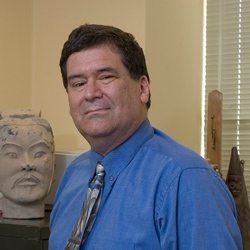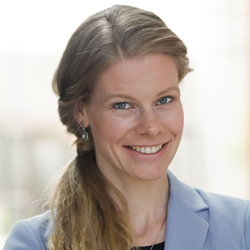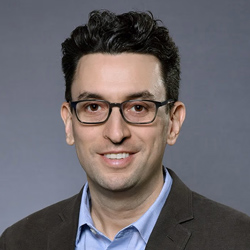Events
Past Event
NICO DECEMBER SEMINAR: Scott Feld, Purdue University "Finding Highly Connected Nodes in Networks: The Power of Common Friends"
Northwestern Institute on Complex Systems (NICO)
11:00 AM
//
Lower Level, Chambers Hall
Details

Speaker:
Scott Feld, Professor of Sociology, Purdue University
Title:
Finding Highly Connected Nodes in Networks: The Power of Common Friends
Abstract:
This paper extends the Friendship Paradox – where friends have more friends than random people do, on average – to the more general phenomenon that mutual friends have more friends than friends do, on average. We show that we can find people who who are friends of multiple people in practical sized random samples in one regional Facebook network of 63,392 people with an average of 24 friends each, where people with two friends in a random sample have an average of 212 friends overall, with three friends have an average of 391 friends, etc. We further illustrate this general network phenomenon by taking random samples of citations from 79,034 journal articles. We find that a source cited by two articles in a random sample has an average of 461 citations, placing it in the top 0.01% in numbers of citations among all sources cited by these articles. We provide a general expression for the expected overall number of friends of a person found to have k friends in a random sample from a population with a given distribution of numbers of friends. We show that the effectiveness of using common friends among random samples for finding highly connected nodes is most pronounced when there are nodes with a great disproportion of the ties, as seems to be both typical and important for many types of social and other networks, such as where there are superspreaders of diseases, mega-influencers on the Internet, and highly connected central nodes in centralized neural networks. We discuss further implications, applications, and directions for further research.
Speaker Bio:
Scott Feld served as Assistant to Full Professor of Sociology at the State University of New York at Stony Brook from 1975-1991. He then served as Professor of Sociology at Louisiana State University from 1991 until 2004, and joined the faculty at Purdue University in 2004. He has published over sixty articles, including twelve published in the most prestigious journals in the fields of Sociology and Political Science. His ongoing research interests involve 1) causes and consequences of patterns in social networks, 2) processes of individual and collective decision making, and 3) applications of sociology, most recently including innovations in marriage and divorce laws (covenant marriage). He regularly teaches undergraduate and graduate courses on social networks, research methods, and statistics.
Location:
In person: Chambers Hall, 600 Foster Street, Lower Level
Remote option: https://northwestern.zoom.us/j/91453237911
Passcode: NICO2024
Time
Tuesday, December 3, 2024 at 11:00 AM - 12:00 PM
Location
Lower Level, Chambers Hall Map
Contact
Calendar
Northwestern Institute on Complex Systems (NICO)
Data Science Nights - February 2026 - Speaker: Siqiao Mu, Engineering Sciences and Applied Mathematics
Northwestern Institute on Complex Systems (NICO)
5:30 PM
//
M416, Technological Institute
Details

FEBRUARY MEETING: Thursday, February 26, 2026 at 5:30pm (US Central)
NEW LOCATION:
ESAM Conference Room, Tech M416
2145 Sheridan Road, Evanston, IL 60208
AGENDA:
5:30pm - Meet and greet with refreshments
6:00pm - Talk with Siqiao Mu, Ph.D. Candidate, Department of Engineering Sciences and Applied Mathematics, Northwestern University
TALK TITLE:
Gradient Algorithms for Machine Unlearning
ABSTRACT:
Machine unlearning algorithms aim to efficiently remove data from a model without retraining it from scratch, in order to remove corrupted or outdated data or respect a user's "right to be forgotten." Since empirical unlearning heuristics can be unreliable, we desire "certified" machine unlearning algorithms, which are theoretically guaranteed to achieve probabilistic indistinguishability between the unlearned model and the model retrained on the retained data samples. While several works have proposed second-order unlearning algorithms, first-order methods such as gradient descent (GD) or stochastic gradient descent (SGD) algorithms are far more computationally tractable for large neural networks. We propose "Rewind-to-Delete," a first-order unlearning algorithm that is also black-box, in that it can be applied to trained models without costly precomputation. We prove certified unlearning guarantees and derive privacy-utility-complexity tradeoffs for both the GD and SGD versions.
DATA SCIENCE NIGHTS are monthly meetings featuring presentations and discussions about data-driven science and complex systems, organized by Northwestern University graduate students and scholars. Students and researchers of all levels are welcome! For more information: http://bit.ly/nico-dsn
FUTURE DATES:
Data Science Nights will be held on Thursday evenings in the winter and spring terms, with future dates on March 19, April 30, and May 28, 2026.
Time
Thursday, February 26, 2026 at 5:30 PM - 7:30 PM
Location
M416, Technological Institute Map
Contact
Calendar
Northwestern Institute on Complex Systems (NICO)
WED@NICO SEMINAR: Ágnes Horvát, Northwestern School of Communication
Northwestern Institute on Complex Systems (NICO)
12:00 PM
//
Lower Level, Chambers Hall
Details

Speaker:
Ágnes Horvát, Associate Professor, Department of Communication Studies, Northwestern School of Communication
Title:
TBA
Abstract:
TBA
Speaker Bio:
Ágnes Horvát is an Associate Professor in the Department of Communication Studies, (by courtesy) the Computer Science Department of the McCormick School of Engineering, and (also by courtesy) the Department of Management and Organizations of the Kellogg School of Management.
Her research seeks to measure, understand, and forecast the collective behaviour of networked crowds in large-scale socio-technical systems. On the one hand, her current projects investigate the impact of network embeddedness and diversity on scholarly communication. On the other hand, she works on identifying expressions of collective intelligence and opportunities for innovation in crowdsourcing communities. Her research group also develops empirical and theoretical methods to support creativity and predict success in culture industries. This work lies at the intersection of computational social science and social computing. It uses an interdisciplinary data-driven approach that builds on techniques from network science, machine learning, and statistics.
Location:
In person: Chambers Hall, 600 Foster Street, Lower Level
Remote option: https://northwestern.zoom.us/j/96701776160
PW: NICO26
About the Speaker Series:
Wednesdays@NICO is a vibrant weekly seminar series focusing broadly on the topics of complex systems, data science and network science. It brings together attendees ranging from graduate students to senior faculty who span all of the schools across Northwestern, from applied math to sociology to biology and every discipline in-between. Please visit: https://bit.ly/WedatNICO for information on future speakers.
Time
Wednesday, March 4, 2026 at 12:00 PM - 1:00 PM
Location
Lower Level, Chambers Hall Map
Contact
Calendar
Northwestern Institute on Complex Systems (NICO)
WED@NICO SEMINAR: Steven Franconeri, Northwestern University "Point Taken: A gamified Intervention that Creates Enlightened Disagreements"
Northwestern Institute on Complex Systems (NICO)
12:00 PM
//
Lower Level, Chambers Hall
Details

Speaker:
Steven Franconeri, Professor of Psychology, Weinberg College of Arts & Sciences; Professor of Management and Organizations, Kellogg School of Management, Northwestern University
Title:
Point Taken: A gamified Intervention that Creates Enlightened Disagreements
Abstract:
Should we drop standardized testing for college or Ph.D. admissions? Allow athletes to join teams based on gender identity? When organizational and public policies bind behavior, human coexistence requires a way to determine that collective policy. Because individuals and like-minded groups have incomplete information, constrained strategies, and biased perspectives, thoughtful debate on those policies is critical. Unfortunately, those debates too often degrade into chaotic fights.
Point Taken provides a scalable solution by translating best practices in conflict resolution and critical thinking into a structured dialogue that can be learned and played in 30 minutes. In this interactive session, you'll play a short game to feel its effects.
Players replace persuasion with a common goal of discovering why they disagree. Dialogue then unfolds thoughtfully and calmly, through chains of short written reasons and responses. We've tested the game extensively in schools and organizations, and conducted a formal pilot study. All show powerful improvements in the tone and quality of debate, across longstanding and strongly-held disagreements. I’ll give background on best practices for enlightened disagreement, show how they translate to the game, ask you to play a game, and then ask for your advice on next steps.
Speaker Bio:
Steven Franconeri is leading scientist, teacher, and speaker on visual thinking, visual communication, and the psychology of data visualization. He is a Professor of Psychology in the Weinberg College of Arts & Sciences at Northwestern, Director of the Northwestern Cognitive Science Program, as well as a Kellogg Professor of Management and Organizations by Courtesy. He is the director of the Visual Thinking Laboratory, where a team of researchers explore how leveraging the visual system - the largest single system in your brain - can help people think, remember, and communicate more efficiently.
His undergraduate training was in computer science and cognitive science at Rutgers University, followed by a Ph.D. in Experimental Psychology from Harvard University, and postdoctoral research at the University of British Columbia. His work on both Cognitive Science and Data Visualization has been funded by the National Science Foundation, as well as the Department of Education, and the Department of Defense. He has received a prestigious National Science Foundation CAREER award, given to researchers who combine excellent research with outstanding teaching, and he has received a Psychonomic Society Early Career award for his research on visual thinking.
Location:
In person: Chambers Hall, 600 Foster Street, Lower Level
Remote option: https://northwestern.zoom.us/j/97198523514
PW: NICO26
About the Speaker Series:
Wednesdays@NICO is a vibrant weekly seminar series focusing broadly on the topics of complex systems, data science and network science. It brings together attendees ranging from graduate students to senior faculty who span all of the schools across Northwestern, from applied math to sociology to biology and every discipline in-between. Please visit: https://bit.ly/WedatNICO for information on future speakers.
Time
Wednesday, March 11, 2026 at 12:00 PM - 1:00 PM
Location
Lower Level, Chambers Hall Map
Contact
Calendar
Northwestern Institute on Complex Systems (NICO)

